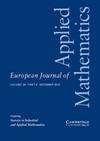二维Keller–Segel–Navier–Stokes系统在快速信号扩散中的稳定性分析
IF 1.1
4区 数学
Q1 MATHEMATICS, APPLIED
引用次数: 4
摘要
本文研究了在自然体积填充假设下,Keller–Segel–Navier–Stokes型全抛物-抛物型流体(PP流体)系统在有界平面域中的稳定性。在快速信号扩散的极限下,我们首先证明了PP流体系统的全局经典解将收敛于相应的抛物-椭圆流体(PE流体)系统的解。作为副产品,我们获得了PE流体系统对于一般大初始数据的全局适定性。我们还为合适的小初始细胞质量建立了一些新的指数时间衰减估计,这特别确保了收敛速度的提高。为了进一步探索稳定性,我们给出了三个不同类型的数值例子:非平凡平衡和平凡平衡,以及旋转聚合。仿真结果说明了实现最优收敛的可能性,并表明PP流体系统和PE流体系统之间的平衡偏差和旋转解误差的剧烈波动消失了。本文章由计算机程序翻译,如有差异,请以英文原文为准。
The stability analysis of a 2D Keller–Segel–Navier–Stokes system in fast signal diffusion
This paper investigates the stability of a fully parabolic–parabolic-fluid (PP-fluid) system of the Keller–Segel–Navier–Stokes type in a bounded planar domain under the natural volume-filling hypothesis. In the limit of fast signal diffusion, we first show that the global classical solutions of the PP-fluid system will converge to the solution of the corresponding parabolic–elliptic-fluid (PE-fluid) system. As a by-product, we obtain the global well-posedness of the PE-fluid system for general large initial data. We also establish some new exponential time decay estimates for suitable small initial cell mass, which in particular ensure an improvement of convergence rate on time. To further explore the stability property, we carry out three numerical examples of different types: the nontrivial and trivial equilibriums, and the rotating aggregation. The simulation results illustrate the possibility to achieve the optimal convergence and show the vanishment of the deviation between the PP-fluid system and PE-fluid system for the equilibriums and the drastic fluctuation of error for the rotating solution.
求助全文
通过发布文献求助,成功后即可免费获取论文全文。
去求助
来源期刊
CiteScore
4.70
自引率
0.00%
发文量
31
审稿时长
>12 weeks
期刊介绍:
Since 2008 EJAM surveys have been expanded to cover Applied and Industrial Mathematics. Coverage of the journal has been strengthened in probabilistic applications, while still focusing on those areas of applied mathematics inspired by real-world applications, and at the same time fostering the development of theoretical methods with a broad range of applicability. Survey papers contain reviews of emerging areas of mathematics, either in core areas or with relevance to users in industry and other disciplines. Research papers may be in any area of applied mathematics, with special emphasis on new mathematical ideas, relevant to modelling and analysis in modern science and technology, and the development of interesting mathematical methods of wide applicability.

 求助内容:
求助内容: 应助结果提醒方式:
应助结果提醒方式:


